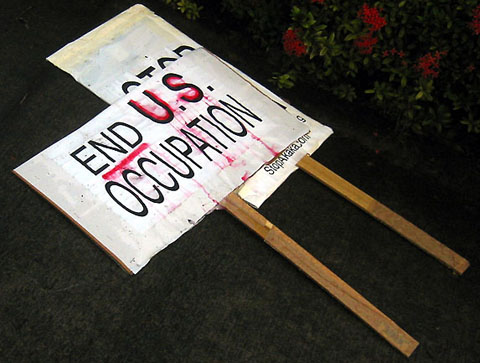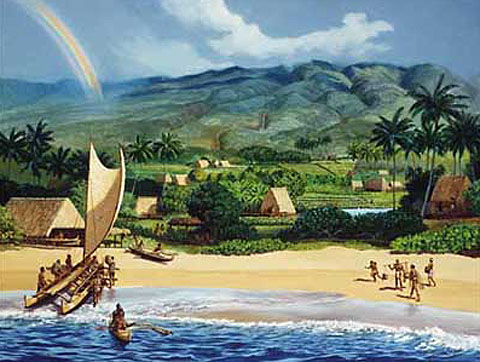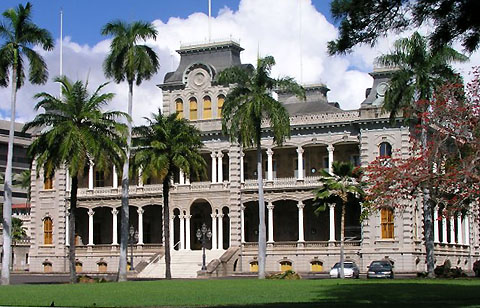
Editor's Note: for a story in today's Garden Island News on sovereignty see
http://www.kauaiworld.com/articles/2007/04/12/news/news01.txt
"...the logical consequences of this resolution would be independence."
- Senator Slade Gorton, Wednesday, October 27, 1993, 103rd Cong. 1st Sess.
United States Public Law 103-150
103d Congress Joint Resolution 19 - Nov. 23, 1993
To acknowledge the 100th anniversary of the January 17, 1893 overthrow of the Kingdom of Hawaii, and to offer an apology to Native Hawaiians on behalf of the United States for the overthrow of the Kingdom of Hawaii.
Whereas, prior to the arrival of the first Europeans in 1778, the Native Hawaiian people lived in a highly organized, self-sufficient, subsistent social system based on communal land tenure with a sophisticated language, culture, and religion;
Whereas, a unified monarchical government of the Hawaiian Islands was established in 1810 under Kamehameha I, the first King of Hawaii;
Whereas, from 1826 until 1893, the United States recognized the independence of the Kingdom of Hawaii, extended full and complete diplomatic recognition to the Hawaiian Government, and entered into treaties and conventions with the Hawaiian monarchs to govern commerce and navigation in 1826, 1842, 1849, 1875, and 1887;
Whereas, the Congregational Church (now known as the United Church of Christ), through its American Board of Commissioners for Foreign Missions, sponsored and sent more than 100 missionaries to the Kingdom of Hawaii between 1820 and 1850;
Whereas, on January 14, 1893, John L. Stevens (hereafter referred to in this Resolution as the "United States Minister"), the United States Minister assigned to the sovereign and independent Kingdom of Hawaii conspired with a small group of non-Hawaiian residents of the Kingdom of Hawaii, including citizens of the United States, to overthrow the indigenous and lawful Government of Hawaii;
Whereas, in pursuance of the conspiracy to overthrow the Government of Hawaii, the United States Minister and the naval representatives of the United States caused armed naval forces of the United States to invade the sovereign Hawaiian nation on January 16, 1893, and to position themselves near the Hawaiian Government buildings and the 'Iolani Palace to intimidate Queen Liliuokalani and her Government;
Whereas, on the afternoon of January 17,1893, a Committee of Safety that represented the American and European sugar planters, descendants of missionaries, and financiers deposed the Hawaiian monarchy and proclaimed the establishment of a Provisional Government;
Whereas, the United States Minister thereupon extended diplomatic recognition to the Provisional Government that was formed by the conspirators without the consent of the Native Hawaiian people or the lawful Government of Hawaii and in violation of treaties between the two nations and of international law;
Whereas, soon thereafter, when informed of the risk of bloodshed with resistance, Queen Liliuokalani issued the following statement yielding her authority to the United States Government rather than to the Provisional Government:
"I Liliuokalani, by the Grace of God and under the Constitution of the Hawaiian Kingdom, Queen, do hereby solemnly protest against any and all acts done against myself and the Constitutional Government of the Hawaiian Kingdom by certain persons claiming to have established a Provisional Government of and for this Kingdom.
"That I yield to the superior force of the United States of America whose Minister Plenipotentiary, His Excellency John L. Stevens, has caused United States troops to be landed a Honolulu and declared that he would support the Provisional Government.
"Now to avoid any collision of armed forces, and perhaps the loss of life, I do this under protest and impelled by said force yield my authority until such time as the Government of the United States shall, upon facts being presented to it, undo the action of its representatives and reinstate me in the authority which I claim as the Constitutional Sovereign of the Hawaiian Islands.".
Done at Honolulu this 17th day of January, A.D. 1893.;
Whereas, without the active support and intervention by the United States diplomatic and military representatives, the insurrection against the Government of Queen Liliuokalani would have failed for lack of popular support and insufficient arms;
Whereas, on February 1, 1893, the United States Minister raised the American flag and proclaimed Hawaii to be a protectorate of the United States;
Whereas, the report of a Presidentially established investigation conducted by former Congressman James Blount into the events surrounding the insurrection and overthrow of January 17, 1893, concluded that the United States diplomatic and military representatives had abused their authority and were responsible for the change in government;
Whereas, as a result of this investigation, the United States Minister to Hawaii was recalled from his diplomatic post and the military commander of the United States armed forces stationed in Hawaii was disciplined and forced to resign his commission;
Whereas, in a message to Congress on December 18, 1893, President Grover Cleveland reported fully and accurately on the illegal acts of the conspirators, described such acts as an "act of war, committed with the participation of a diplomatic representative of the United States and without authority of Congress", and acknowledged that by such acts the government of a peaceful and friendly people was overthrown;
Whereas, President Cleveland further concluded that a "substantial wrong has thus been done which a due regard for our national character as well as the rights of the injured people requires we should endeavor to repair" and called for the restoration of the Hawaiian monarchy;
Whereas, the Provisional Government protested President Cleveland's call for the restoration of the monarchy and continued to hold state power and pursue annexation to the United States;
Whereas, the Provisional Government successfully lobbied the Committee on Foreign Relations of the Senate (hereafter referred to in this Resolution as the "Committee") to conduct a new investigation into the events surrounding the overthrow of the monarchy;
Whereas, the Committee and its chairman, Senator John Morgan, conducted hearings in Washington, D.C., from December 27,1893, through February 26, 1894, in which members of the Provisional Government justified and condoned the actions of the United States Minister and recommended annexation of Hawaii;
Whereas, although the Provisional Government was able to obscure the role of the United States in the illegal overthrow of the Hawaiian monarchy, it was unable to rally the support from two-thirds of the Senate needed to ratify a treaty of annexation;
Whereas, on July 4, 1894, the Provisional Government declared itself to be the Republic of Hawaii;
Whereas, on January 24, 1895, while imprisoned in 'Iolani Palace, Queen Liliuokalani was forced by representatives of the Republic of Hawaii to officially abdicate her throne;
Whereas, in the 1896 United States Presidential election, William McKinley replaced Grover Cleveland;
Whereas, on July 7, 1898, as a consequence of the Spanish-American War, President McKinley signed the Newlands Joint Resolution that provided for the annexation of Hawaii;
Whereas, through the Newlands Resolution, the self-declared Republic of Hawaii ceded sovereignty over the Hawaiian Islands to the United States;
Whereas, the Republic of Hawaii also ceded 1,800,000 acres of crown, government and public lands of the Kingdom of Hawaii, without the consent of or compensation to the Native Hawaiian people of Hawaii or their sovereign government;
Whereas, the Congress, through the Newlands Resolution, ratified the cession, annexed Hawaii as part of the United States, and vested title to the lands in Hawaii in the United States;
Whereas, the Newlands Resolution also specified that treaties existing between Hawaii and foreign nations were to immediately cease and be replaced by United States treaties with such nations;
Whereas, the Newlands Resolution effected the transaction between the Republic of Hawaii and the United States Government;
Whereas, the indigenous Hawaiian people never directly relinquished their claims to their inherent sovereignty as a people or over their national lands to the United States, either through their monarchy or through a plebiscite or referendum;
Whereas, on April 30, 1900, President McKinley signed the Organic Act that provided a government for the territory of Hawaii and defined the political structure and powers of the newly established Territorial Government and its relationship to the United States;
Whereas, on August 21,1959, Hawaii became the 50th State of the United States;
Whereas, the health and well-being of the Native Hawaiian people is intrinsically tied to their deep feelings and attachment to the land;
Whereas, the long-range economic and social changes in Hawaii over the nineteenth and early twentieth centuries have been devastating to the population and to the health and well-being of the Hawaiian people;
Whereas, the Native Hawaiian people are determined to preserve, develop and transmit to future generations their ancestral territory, and their cultural identity in accordance with their own spiritual and traditional beliefs, customs, practices, language, and social institutions;
Whereas, in order to promote racial harmony and cultural understanding, the Legislature of the State of Hawaii has determined that the year 1993, should serve Hawaii as a year of special reflection on the rights and dignities of the Native Hawaiians in the Hawaiian and the American societies;
Whereas, the Eighteenth General Synod of the United Church of Christ in recognition of the denomination's historical complicity in the illegal overthrow of the Kingdom of Hawaii in 1893 directed the Office of the President of the United Church of Christ to offer a public apology to the Native Hawaiian people and to initiate the process of reconciliation between the United Church of Christ and the Native Hawaiians; and
Whereas, it is proper and timely for the Congress on the occasion of the impending one hundredth anniversary of the event, to acknowledge the historic significance of the illegal overthrow of the Kingdom of Hawaii, to express its deep regret to the Native Hawaiian people, and to support the reconciliation efforts of the State of Hawaii and the United Church of Christ with Native Hawaiians;
Now, therefore, be it
Resolved by the Senate and House of Representatives of the United States of America in Congress assembled,
SECTION 1. ACKNOWLEDGMENT AND APOLOGY.
The Congress -
(1) on the occasion of the 100th anniversary of the illegal overthrow of the Kingdom of Hawaii on January 17, 1893, acknowledges the historical significance of this event which resulted in the suppression of the inherent sovereignty of the Native Hawaiian people;
(2) recognizes and commends efforts of reconciliation initiated by the State of Hawaii and the United Church of Christ with Native Hawaiians;
(3) apologizes to Native Hawaiians on behalf of the people of the United States for the overthrow of the Kingdom of Hawaii on January 17, 1893 with the participation of agents and citizens of the United States, and the deprivation of the rights of Native Hawaiians to self-determination;
(4) expresses its commitment to acknowledge the ramifications of the overthrow of the Kingdom of Hawaii, in order to provide a proper foundation for reconciliation between the United States and the Native Hawaiian people; and
(5) urges the President of the United States to also acknowledge the ramifications of the overthrow of the Kingdom of Hawaii and to support reconciliation efforts between the United States and the Native Hawaiian people.
SEC. 2. DEFINITIONS.
As used in this Joint Resolution, the term "Native Hawaiians" means any individual who is a descendent of the aboriginal people who, prior to 1778, occupied and exercised sovereignty in the area that now constitutes the State of Hawaii.
SEC. 3. DISCLAIMER.
Nothing in this Joint Resolution is intended to serve as a settlement of any claims against the United States.
Approved November 23, 1993
|


